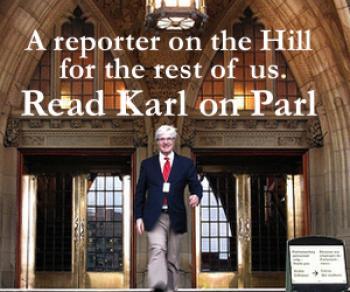Andrew Coyne pretty much sums up the F-35 debacle when he calls it a “failure of democratic accountability.”
It is hard to disagree when the Postmedia columnist says the Conservative government is guilty of “electoral fraud.”
This is a government that decided to buy a particular aircraft without seeking competitive bids, and then designed specifications to suit that aircraft, ex post facto.
Having betrayed sound practices in that flagrant way, the government went on to dissimulate about the true cost of the purchase and refused to share information with Parliament, for which it was held in contempt.
That contempt citation precipitated a general election campaign, during which the national media conveniently forgot about the brewing F-35 scandal.
The Conservatives successfully framed the voters’ choice as one of instability and uncertainty versus a secure, competent, majority government.
Just about every newspaper in Canada that endorsed a party endorsed the Conservatives. That group included those that had been sharply critical of Prime Minister Harper’s contempt for democratic institutions, only partly exemplified by his government’s behaviour on the F-35 file.
The Conservatives appealed to fear of instability in parlous economic times, and convinced enough Canadians, especially middle class suburbanites, to side with them against the spectre of some sort of scary, centre-left-separatist “coalition.”
Some of the planet’s most stable and prosperous democracies have never known anything but coalition government. But that is a different story.
Voter suppression — to assure victory
Just in case the stability argument, and the support of the mainstream media, were not quite enough, it is now becoming clear that the Conservatives engaged in unprecedented voter suppression tactics to help seal their victory. It is quite plausible that those tactics made the difference between another Conservative minority (out of which an alternative coalition government could have emerged) and the slim majority Harper’s party won.
On Monday, the Federal Court will start looking at the impact of those tactics in six ridings, while Elections Canada continues to investigate the entire matter as it affected all of Canada.
Still, there is every chance we will never know the full extent of the shenanigans that took place during the 2011 election campaign.
This coming week the government will release the KPMG report on the F-35 deal.
It is almost certain that the deal is off.
What will now happen is that either the Government will be looking for another supplier than Lockheed Martin, maker of the F-35; or it will open the whole process to competitive bids from a variety of companies, possibly including Lockheed Martin.
Neither of those options was the firm and unshakable policy at the time of the last election.
Defence Minister Peter MacKay and the Prime Minister were emphatic: this Government would buy the F-35, no matter what others had to say, end of story.
So far, the government’s only defence of itself is to say, as Public Works Minister Rona Ambrose has in the House, that it has “reset” the aircraft purchase process, a process that will now be “transparent.”
A pretty frank admission, there, that the process, for years, had been anything but transparent.
Will blowing verbal smoke work for the Conservatives?
On Saturday, the Conservatives put forward up-and-comer Chris Alexander, the Defence Minister’s Parliamentary Secretary, to speak to CBC Radio’s The House.
Alexander did a bit of whining that the media have somehow paid insufficient attention to the Government’s current, ephemeral “seven-point plan” on the F-35, then candidly admitted that, yes, “government’s plans change, they evolve.”
The government is now in über damage control mode.
A purchase and deal the Conservatives had pursued with badger-like intensity since coming to office — slamming and, in some cases, slandering anyone who opposed it — is now, for all intents and purposes, a dead letter.
Just about everything about the F-35 deal was flawed from the outset, starting with the fact that — as the Rideau Institute’s Steven Staples pointed out back in 2011 — the F-35 is not even the appropriate aircraft for the task of protecting Canada’s arctic and coastal frontier.
Staples explained that F-35s are designed as heavy attackers and bombers, suited more for aggressive action than light, deft and mobile defence of remote and isolated territory.
But even if one accepted that Canada needed a costly aircraft more suited for waging war in distant theatres than defending Canadian territory, the secret, borderline dishonest and arrogant way in which Government handled the whole matter has few precedents in Canadian history.
The pipeline affair of the 1950s, that precipitated the defeat of the Liberal St Laurent government, was child’s play compared to this F-35 affair.
However, the key question is: will those who opted for Harper as the “safe and secure” choice in 2011 see it that way?
Or, will the Conservatives be able to tough it out, puff a lot of smoke over the issue, and count on public apathy and lack of interest in the complex and arcane details of public policy?
Judging by their tactics so far, the Conservatives earnestly hope they will be able to do that.
They seem to believe there are enough, to use the American phrase, “low information voters” out there to save them from what should be the inevitable electoral consequence of this sort of scandal.



